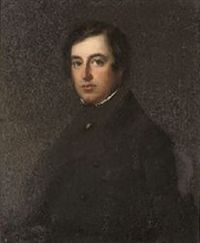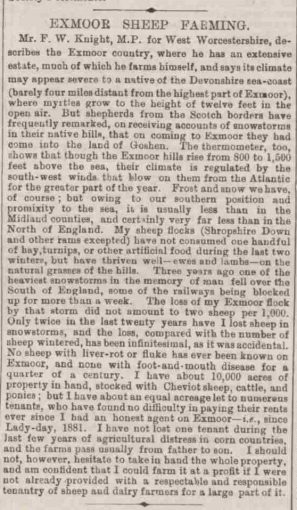
Image from https://en.wikipedia.org/
Exmoor may seem like a forbidding, remote or even extreme environment to our modern minds. To the Scottish shepherds who travelled south to Exmoor in the 19th century to work for Frederic Winn Knight it would have felt very much like home from home. Most of them came from similar, or even more, remote rural areas in the Scottish Borders and they were used to wild weather and wild countryside.
But could it be that coming south might seem like coming to the Land of Goshen for these shepherd families? Frederic Knight seemed to think so. On the 6th of November 1883 he had an article published in the Exeter and Plymouth Gazette about Exmoor sheep farming.

He says in the article that although the climate of Exmoor may seem severe to a native of the Devonshire sea-coast the “shepherds from the Scotch borders have frequently remarked, on receiving accounts of snowstorms in their native hills, that on coming to Exmoor they had come into the land of Goshen.”
He explains how his sheep flocks need no additional feed during the winter months and that “only twice in the last twenty years have I lost sheep in snowstorms and the loss compared with the number of sheep wintered has been infinitesimal, as it was accidental. No sheep with liver-rot or fluke has ever been known on Exmoor.”
Although Mr Knight doesn’t make clear precisely what he means by Land of Goshen – nor what the accident was that caused the loss of sheep during winter – it can probably be assumed he was referring to the balmy climate and agricultural benefits of farming in Southern England. The newspaper article gives a very positive view of sheep farming on Exmoor at the end of the 1800s and should probably be seen as a bit of free media for Mr Knight wishing to put a very positive spin on his agricultural activities on Exmoor.
The Friends researches into the Scottish shepherds at Hoar Oak Cottage and elsewhere on Exmoor don’t necessarily paint a similar picture. Their lives, for the most part, included highs and lows, good times and bad times. Some stayed on Exmoor. Most went back to their homes and families in Scotland. So was Exmoor their Land of Goshen? Maybe it was a bit warmer then the Scottish Borders. Maybe the chance of a job with a cottage was attractive. Maybe sheep farming in the south was easier than in the north.
We’ll never know. We can only be sure that Frederic Knight certainly thought it was. At least according to what he wrote in this newspaper article published over 130 years ago.
